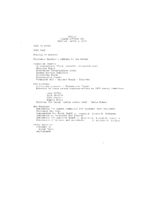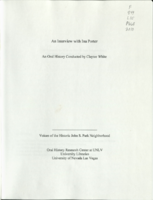Search the Special Collections and Archives Portal
Search Results

Transcript of interview with Don Laughlin by Stefani Evans and Claytee White, October 10, 2016
Date
Archival Collection
Description
Minnesotan Don Laughlin landed far from the land of (more than) 10,000 lakes. His office 90 miles south of Las Vegas in the eponymous town of Laughlin commands an unimpeded view of a very different landscape from that of his youth. Here, where the Colorado River flows south through one of its narrowest channels, Laughlin arrived in about 1966 and purchased what would become the Riverside Resort Hotel and Casino. The endeavor was so successful that the then-settlement of 10 to 15 people at that tiny spot on the river grew to be an unincorporated town housing more than 7,000 people in 2010. Today, Laughlin the man continues to promote and support Laughlin the town via flood control projects and infrastructure development. In this interview, Laughlin sits amid the antique slot machines in his office and enjoys the view as he recalls his childhood on the family farm in southern Minnesota, and talks about leaving the farm in the late 1940s for nearby Owatonna to do watchmaking and watch repairing while simultaneously running a slot machine and pinball parlor. After visiting Las Vegas on vacation, he arrived permanently in 1952 and bartended at the Thunderbird Hotel until he bought his own bar and restaurant in Downtown Las Vegas, which he named Laughlin’s Made Right Café. After selling the café, he bought the 101 Club in North Las Vegas. He began searching for a casino for a casino to buy, seeking only those located on the border of a state that did not allow gambling. When he found the small hotel/casino on the Colorado River he purchased it. He talks of building an airstrip across the street and making daily trips to Las Vegas to buy groceries, beer, and toilet paper-essentially, everything one would need to run a hotel, restaurant, and casino-sometimes making three trips in one day. He continues to own and manage his hotel/casino at the age of 85, and he is in his office every day, all day, seven days a week. He gave up flying last year because he claims he’s too old to pilot his own aircraft. So is especially advantageous that the town that bears his name can now supply almost everything that he and the Riverside Resort Hotel and Casino need.
Text

Transcript of interview with Alfred "Al" Isola by Stephen Kalish, March 15, 1976
Date
Archival Collection
Description
On March 15, 1976, Stephen Kalish interviewed Alfred “Al” Isola (born August 3rd, 1917 in Oakland, California) in his office about his garbage company and early Southern Nevada. The two discuss Las Vegas’ lack of a unified garbage system and how dumping sites have had to adjust their practices in order to limit their impact on pollution. Isola also explains the different disposal protocols for wet and dry trash. On the second tape of the interview, an unidentified woman enters the conversation.
Text

Transcript of Interview with Merna Dennison by Ken Pyatt, March 1, 1980
Date
Archival Collection
Description
Text

Meeting minutes for Consolidated Student Senate, University of Nevada, Las Vegas, March 5, 1974
Date
Archival Collection
Description
Text

Angela Castro oral history interview: transcript
Date
Archival Collection
Description
Oral history interview with Angela Castro conducted by Stefani Evans, Cecilia Winchell, Kristel Peralta, Vanessa Concepcion, and Ayrton Yamaguchi on November 05, 2020 for the Reflections: The Las Vegas Asian American and Pacific Islander Oral History Project. Castro begins the interview by talking about her early life, childhood, what Guam was like, and the history of her parents and grandparents. She describes the difference in public and private education in Guam and compares it to the United States. She explains the reason why she moved to Las Vegas, Nevada in 1998 and attended the University of Nevada, Las Vegas for public relations. Castro then talks about the differences between older and newer generations, the political atmosphere in Guam, and the differences between the United States and Guam in politics. She also talks about the discrimination she has experienced throughout her life and diversity in the workplace. Lastly, she describes her culture and traditions during holidays, the struggles with an absence of culture within her family, and her personal religious beliefs.
Text

John Fudenberg oral history interview: transcripts
Date
Archival Collection
Description
Oral history interviews with John Fudenberg conducted by Barbara Tabach and Claytee D. White on May 3, 2018 and May 23, 2018 for the Remembering 1 October Oral History Project. In this interview, John Fudenberg, the coroner for Clark County in Las Vegas, Nevada, gives an account of his experience during the October 1, 2017 mass shooting on the Las Vegas Strip and what his role was during the tumultuous days after the shooting. He explains how he and the staff of the coroner's office prepared for the large number of casualties as well as their arrival at the Route 91 Harvest festival venue. Fudenberg speaks of setting up the Family Assistance Center at the convention center and how it supported the community but also aided the coroner's office in gathering information about the deceased and identifying them. Fudenberg discusses the main job of the Coroner's Office during the first week after the shooting, which was to autopsy the bodies and communicate with the families, as well as the Police Department. He also talks about the emotional impact the shooting and its aftermath had on him and his staff members and the wellness program they implemented, of which trauma yoga and meditation had a large impact.
Text

Mike Meade interview, February 28, 1977: transcript
Date
Archival Collection
Description
On February 28, 1977, collector Steve Gortz interviewed Mike Meade (b. September 16, 1950 in San Francisco, California) about his life in Nevada. Meade speaks about growing up in Tonopah, Nevada before its decline in population, his move to Elko, Nevada and eventually to the city of Las Vegas. Moreover, he talks about the development of the Strip, the differences between Las Vegas and rural Nevada, as well as the changing environmental landscape. Meade also spends time discussing the controversy surrounding the University of Nevada, Las Vegas (UNLV) dormitory at the time of this interview, the attitude of locals, and his opinion on brothels and prostitution. Lastly, Meade talks about the city’s pollution, the sports and recreation throughout the whole of the state and ends by reading a poem about Nevada from a Bicentennial book.
Text

Transcript of interview with Marie Jordan by Danny Budak, March 20, 1978
Date
Archival Collection
Description
On March 20, 1978, collector Danny Budak interviewed the University of Nevada Las Vegas (UNLV) bookstore buyer, Marie Jordan (born June 26th, 1940 in Arizona) in the UNLV library. This interview offers Marie Jordan’s personal perspective of life in Nevada, being a local resident for twenty years. Marie also discusses family life and changes that she has witnessed in the Valley.
Text

Wilma Cooper interview, February 27, 1977: transcript
Date
Archival Collection
Description
On February 27, 1977, collector Sara Finklea interviewed housekeeper, Wilma Cooper (born December 19th, 1913 in Rock Springs, South Wyoming) in her home in Boulder City, Nevada. This interview covers Boulder City and Henderson.
Text

Transcript of interview with Ina Porter by Claytee White, January 5, 2010
Date
Archival Collection
Description
Ina Porter recalls the story of choosing to move to the John S. Park Neighborhood in the 1940s. She and her husband Burdell were accustom to paying cash for everything and needed to establish credit with Sears to purchase their $5000 home, which was not considered inexpensive. They were among the earlier homeowners and soon the neighborhood grew to include a Mormon Church that would become so integral to the Porter family's life and to the John S. Park community. Ina was born 1917 in the small southern Utah town of Kanab. She describes her youth and speaks of the Great Depression. Ina graduated from high school in 1935, married in 1936 and moved to Las Vegas, where there were jobs for her husband. Finding work after his graduation from college was not easy, but because he had been a bus driver he was able to secure a position driving a bus for the Union Pacific Railroad and later Greyhound Bus Line. Years later Ina, Burdell and their family were part of the fiber of the Joh
Text
